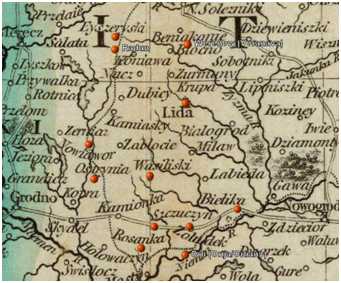|
compiled by
Ellen Sadove Renck from the sources listed at the bottom of the page
Alternate names: Baksty/Bakst/Baksht-Borishoka
The village was first mentioned in the chronicles of the Crusaders in
fourteenth century. In 1387, the Grand Duke of the Lithuanian
Principality, Yagailo, gave Bakshty and the volostj to the Catholic
Church of St. Stanislav of Vilna. In 1440-1492, Bakshty belonged to
Kezhgailo. From 1795 Bakshty was part of the Russian Empire and volostj
center in Oshmyany pavet. In 1886, Bakshty had 83 houses, 918 people,
two Orthodox churches, a synagogue, a tavern, and two pubs. 1912:
Yeshi-bar Zachri Mendel Hacohen Katz (1856-?) was rabbi, son of a rabbi
in Radin (but could be another town NE nearer to Minsk.)
In 1915, Germans occupied it. In 1921, Bakshty
belonged to Oshmyanski pavet of Wilno voevodstvo of Poland. 1921,
Bakshty was a weis (village) and gmina (rural administrative district
roughly equal to a township) of Wolozyn uezd. In 1941, German troops
occupied Bakshty. In 1944, the Red Army liberated it.
As of 1993, BAKSHTY was a village in Ivje region,
situated on the river Berezina, forty kilometers from Ivje and
twenty-five kilometers from the railway station at Yuratishki. The 1991
population was 3,055 with 1,455 houses. In 1991, Bakshty had a school,
a House of Culture, a hospital, and a Monument to the Victims of
Fascism (Nazis).
Slownik Geograficzny Krolestwa Polskiego:
p. 85:
Bakszty, 1) gm. i ws., pow. Oszmianski, liczy 475 dymów.,
3473 wlo c. ob. p?. Zarz?d gminy we wsi Baskzty. Gmina sk?ada si? z 3
okr?gow wiejskich: Bakszty, Grabowo, Dziewiergi liczy 52 wsi.
Bakszty, 1) rural administrative district and village, Oszmiany
district, with 475 homesteads, 3,473 farmers/peasants, &
inhabitants of both sexes. Management communes in the village of
Bakshty. Rural administrative district composed of 3 rural districts:
Bakszty, Grabowo, Dziewiergi -- 52 villages in all. [Translation thanks
to Jan Sekta].
Sources:
Sachenka, B.I. [editor],
Encyclopedia of the History of Belarus. Minsk: 1993. Volume 1, p. 282.
Ksiega Adresowa Handlowa,
Warszawa Bydgoszcz 1929
If
you have Lida uezd
materials to share, please considering donating it.
If you read Yiddish or Hebrew, please contact us.
Records are
held both in Grodno and Vilna archives.For Lida records translation,
your tax deductible contribution by credit card via the secure server
at either group or by mail will grow our knowledge. For a $100
donation, you receive all these records translated two years ahead of
their posting on JewishGen. Every penny collected is used for Lida uezd
projects only. Records include censuses; family lists; marriages,
births, death records; prenumeraten lists; and more. Please contact Judy Baston
with any questions.For current translations, please see the ALD:
All Lithuanian Database and Belarus
SIG Database.
|

